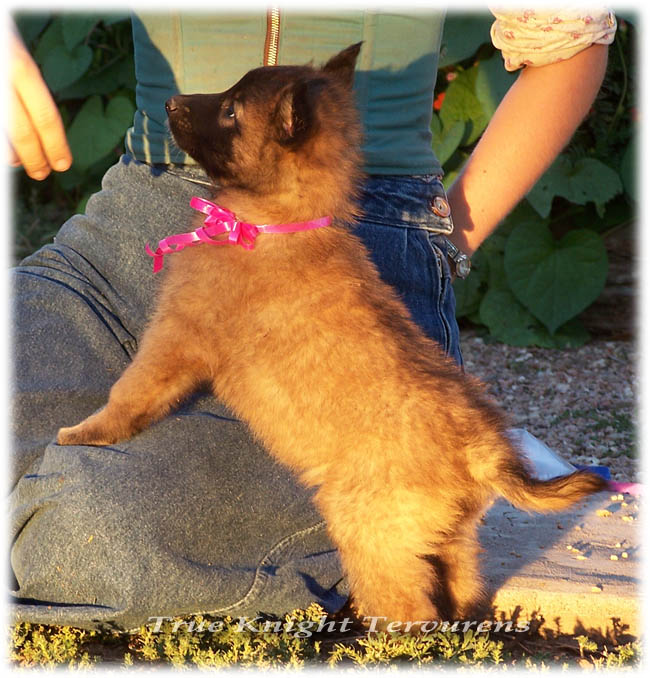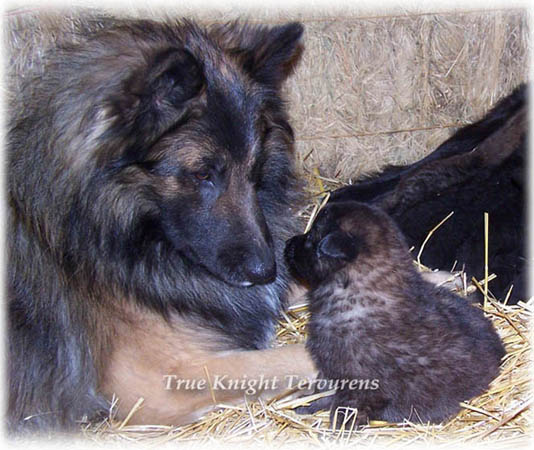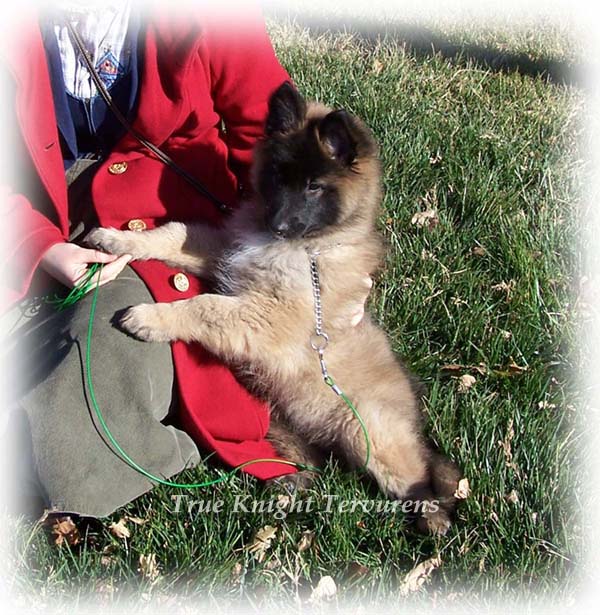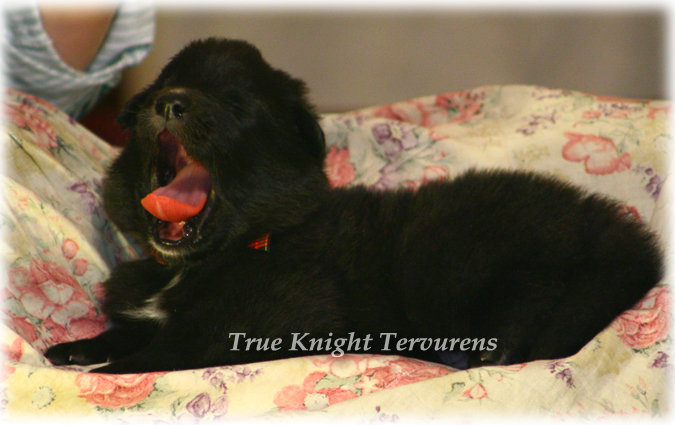"Harper" at 6 weeks.
Celebrating the beauty & brains of the Tervuren breed; and Belgian Shepherds in general.
Thursday, November 28, 2013
Monday, November 25, 2013
Q.P.A.: Answered! "Wolf dog?"
Questions People Ask: Answered!
Even though the breed has been around for a long time, many Belgian Shepherd owners have to be ready with responses to some pretty common questions.... which we'll try to cover here.
One of these is: "Is it part wolf?"
The answer to that, of course, is "No".
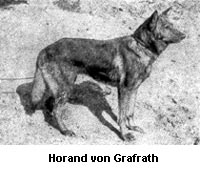 ~ As an aside: it
is actually the German Shepherd that holds that honor, being founded by
Captain Max
~ As an aside: it
is actually the German Shepherd that holds that honor, being founded by
Captain Max
Von Stephanitz based on his prized dog "Hektor" (renamed "Horand" von Grafath); recorded to be three quarters herding dog and one quarter wolf.
Later he brought in two more 1/4 wolf dogs as prominent breeding sires, and the progeny of these dogs Von Stephanitz so admired are the foundations of German Shepherds today. ~
The Belgian Shepherd was established around the same time that Captain Von Stephanitz set up the German Shepherd Dog Club; the English Collie had been standardized shortly before as well... and a group of Belgian dog enthusiasts decided that Belgium needed a shepherd breed, too. They searched the various shepherds from around the country, and found that the province of Brabant supported a certain consistent type that was distinct from other country's breeds.
This they choose to be the Belgian Shepherd, and in 1892 the first standard for the Belgian Shepherd Dog was issued. It recognized three varieties: dogs with long coats, short coats and rough coats.
There is absolutely no record or hint of a record (that I can find at all) that ever suggests there is any wolf in the Belgian Shepherd Dog.
So even though the uninitiated will probably always ask "Is that a wolf dog?!" it is only the alert stance, pricked ears and proud bearing that makes people think of a regal, free spirit.
And as Tervs all know, it's much better being partners.... and lots more fun!
Even though the breed has been around for a long time, many Belgian Shepherd owners have to be ready with responses to some pretty common questions.... which we'll try to cover here.
One of these is: "Is it part wolf?"
The answer to that, of course, is "No".
 ~ As an aside: it
is actually the German Shepherd that holds that honor, being founded by
Captain Max
~ As an aside: it
is actually the German Shepherd that holds that honor, being founded by
Captain Max Von Stephanitz based on his prized dog "Hektor" (renamed "Horand" von Grafath); recorded to be three quarters herding dog and one quarter wolf.
Later he brought in two more 1/4 wolf dogs as prominent breeding sires, and the progeny of these dogs Von Stephanitz so admired are the foundations of German Shepherds today. ~
The Belgian Shepherd was established around the same time that Captain Von Stephanitz set up the German Shepherd Dog Club; the English Collie had been standardized shortly before as well... and a group of Belgian dog enthusiasts decided that Belgium needed a shepherd breed, too. They searched the various shepherds from around the country, and found that the province of Brabant supported a certain consistent type that was distinct from other country's breeds.
This they choose to be the Belgian Shepherd, and in 1892 the first standard for the Belgian Shepherd Dog was issued. It recognized three varieties: dogs with long coats, short coats and rough coats.
There is absolutely no record or hint of a record (that I can find at all) that ever suggests there is any wolf in the Belgian Shepherd Dog.
So even though the uninitiated will probably always ask "Is that a wolf dog?!" it is only the alert stance, pricked ears and proud bearing that makes people think of a regal, free spirit.
And as Tervs all know, it's much better being partners.... and lots more fun!
Thursday, November 21, 2013
Monday, November 18, 2013
Part 3: Tervuren History
It seems that around the turn of
the century setting up breed clubs, with breed standards and records of
pedigree, became the popular thing to do.
To understand the establishing of these breed clubs, we have to think in terms of the day. Prior to this, dogs were known by their varieties, and those were often named for the regions in which they had developed.
With the advent of the Age of Industry, dogs began to lose their important place in the lives of their people. Cities grew, factories did not need dogs. The local varieties began to diminish, and at the same time, a moneyed class unconnected with the daily work of the farm was emerging. These people often took it upon themselves to preserve the breeding of the dogs they fancied.
In southwest Germany, the town of Rottweil had a type of muscular dogs of mastiff descent which helped both with herding the livestock, protecting it, and also pulling small carts for deliveries around town.
So suddenly, in 1901 the Rottweiler & Leonberger Club came into being.
In the fall of 1891 a group in Belgian formed the Club du Chein de Berger Belge (Belgian Shepherd Dog Club) "for the purpose of determining if there was a true shepherd dog representative only of Belgium." Shortly after, veterinary professor Adolphe Reul headed up a gathering on the outskirts of Brussels to find the dog for the club. Seeing a distinctively different type consistent among the shepherd dogs of Brabant, they settled on this as their Chein de Burger Belge, and the Belgian Shepherd was born.
It would take a decade for the club and it's dogs to be recognized by the Societe Royale Saint-Hubert (the Belgium equivalent of the AKC,) but the Belgian Shepherd was here to stay.
And the year 1911 saw the first Belgian Shepherds to be registered in the AKC.
To understand the establishing of these breed clubs, we have to think in terms of the day. Prior to this, dogs were known by their varieties, and those were often named for the regions in which they had developed.
With the advent of the Age of Industry, dogs began to lose their important place in the lives of their people. Cities grew, factories did not need dogs. The local varieties began to diminish, and at the same time, a moneyed class unconnected with the daily work of the farm was emerging. These people often took it upon themselves to preserve the breeding of the dogs they fancied.
In southwest Germany, the town of Rottweil had a type of muscular dogs of mastiff descent which helped both with herding the livestock, protecting it, and also pulling small carts for deliveries around town.
So suddenly, in 1901 the Rottweiler & Leonberger Club came into being.
In the fall of 1891 a group in Belgian formed the Club du Chein de Berger Belge (Belgian Shepherd Dog Club) "for the purpose of determining if there was a true shepherd dog representative only of Belgium." Shortly after, veterinary professor Adolphe Reul headed up a gathering on the outskirts of Brussels to find the dog for the club. Seeing a distinctively different type consistent among the shepherd dogs of Brabant, they settled on this as their Chein de Burger Belge, and the Belgian Shepherd was born.
It would take a decade for the club and it's dogs to be recognized by the Societe Royale Saint-Hubert (the Belgium equivalent of the AKC,) but the Belgian Shepherd was here to stay.
And the year 1911 saw the first Belgian Shepherds to be registered in the AKC.
Thursday, November 14, 2013
Monday, November 11, 2013
"What is a Belgian Shepherd?" Part II
In the last "What is a Belgian Shepherd?" post, we covered the basics. But there are more details just below that surface.
Being an all around farm dog, they needed to be both brave and brainy; so that they could face down any danger to their charges, and listen well so they could work quickly in sync with their masters, as well as improvise in a pinch.
 As may be expected, Belgian Shepherds are highly intelligent. (I've known people
describe them as "scary smart" and it is pretty much true.") They watch
their people to such a high degree that their owners need to be very
aware of what they're communicating with their body language, or they can
mess the poor dog up. These dogs read every move, and are happiest when
included in what-so-ever their person happens to be doing.
As may be expected, Belgian Shepherds are highly intelligent. (I've known people
describe them as "scary smart" and it is pretty much true.") They watch
their people to such a high degree that their owners need to be very
aware of what they're communicating with their body language, or they can
mess the poor dog up. These dogs read every move, and are happiest when
included in what-so-ever their person happens to be doing.
If allowed to integrate with their person in daily life, they can get to the point where it seems they understand English.
They are dogs of extreme loyalty, and this can be vouched for by any who have had them. This of course must be taken into consideration when raising a puppy, they need to be properly exposed to friendly outsiders and shown that strangers generally pose no threat.
They are vigilant watchdogs, highly alert; they notice everything and will quickly bark at a stranger, (or strange thing). A well raised Tervuren will mirror the owner's attitude, if you say "It's okay" then it's okay. If you don't like it, they don't like it. If it's trying to kill you... well, I'd hate to say what will end up happening to it.
Being an all around farm dog, they needed to be both brave and brainy; so that they could face down any danger to their charges, and listen well so they could work quickly in sync with their masters, as well as improvise in a pinch.
 As may be expected, Belgian Shepherds are highly intelligent. (I've known people
describe them as "scary smart" and it is pretty much true.") They watch
their people to such a high degree that their owners need to be very
aware of what they're communicating with their body language, or they can
mess the poor dog up. These dogs read every move, and are happiest when
included in what-so-ever their person happens to be doing.
As may be expected, Belgian Shepherds are highly intelligent. (I've known people
describe them as "scary smart" and it is pretty much true.") They watch
their people to such a high degree that their owners need to be very
aware of what they're communicating with their body language, or they can
mess the poor dog up. These dogs read every move, and are happiest when
included in what-so-ever their person happens to be doing.If allowed to integrate with their person in daily life, they can get to the point where it seems they understand English.
They are dogs of extreme loyalty, and this can be vouched for by any who have had them. This of course must be taken into consideration when raising a puppy, they need to be properly exposed to friendly outsiders and shown that strangers generally pose no threat.
They are vigilant watchdogs, highly alert; they notice everything and will quickly bark at a stranger, (or strange thing). A well raised Tervuren will mirror the owner's attitude, if you say "It's okay" then it's okay. If you don't like it, they don't like it. If it's trying to kill you... well, I'd hate to say what will end up happening to it.
Thursday, November 7, 2013
Monday, November 4, 2013
What is a Tervuren?
The Belgian Shepherd, as it is known around the world, (or "chien de berger Belge") is a somewhat rare breed, both in America and abroad.
I have found walking a Tervuren in public to be a delightful experience, I've never met more strangers in such a short time! A Tervuren can't be overlooked, and most folks find them irresistible. They have to ask about them, pet them and every once in a while, (and most touching of all,) share their story of the "best dog of their life".
A Belgian.
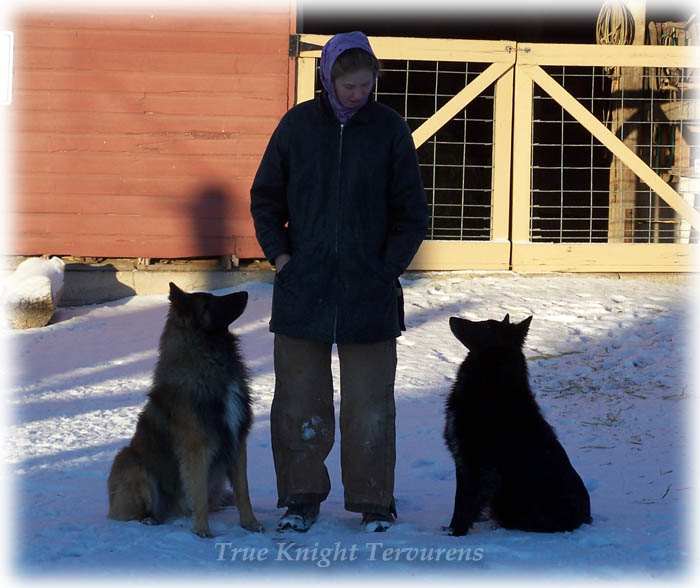 We'll explore further into the history and uses of these unique dogs, but right now for a quick overview.
We'll explore further into the history and uses of these unique dogs, but right now for a quick overview.
The Belgian Shepherd is a shepherd dog.
In the years that followed Belgian Shepherds have performed in almost every capacity known to man to help their handlers; from Herding to NARC dogs, guarding the home to Search and Rescue (a black Belgian was at ground zero after 9/11)
They have been farm dogs, war dogs, police dogs, family dogs, and children's dogs.
For fun, they love to learn anything their person teaches them, from every-day commands to parlor tricks to competing in Agility, Fly Ball, Schutzhund, Obedience, Showmanship, Tracking, Herding trials, even high jumping into water as Dock Dogs!
Subscribe to:
Comments (Atom)
